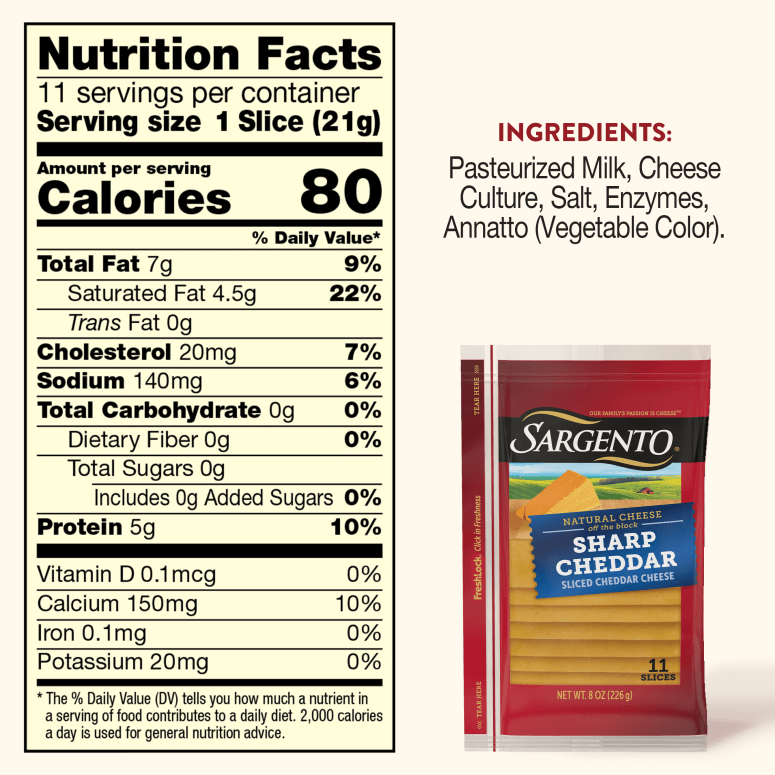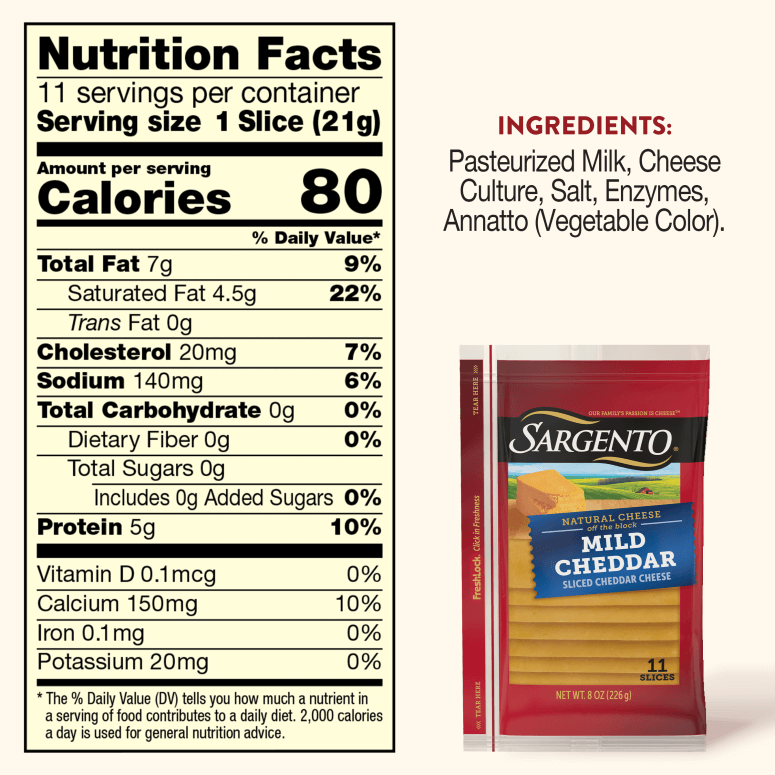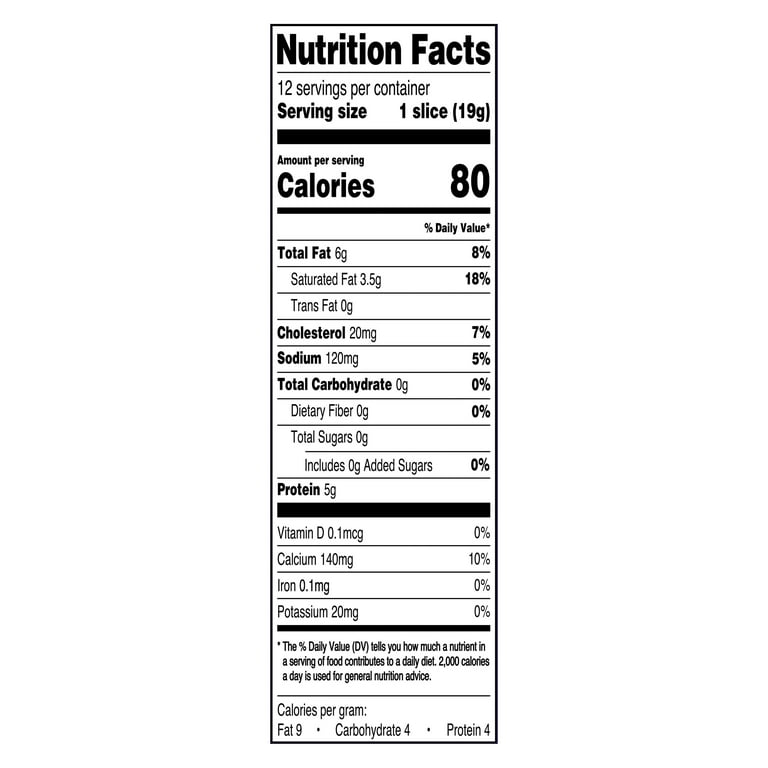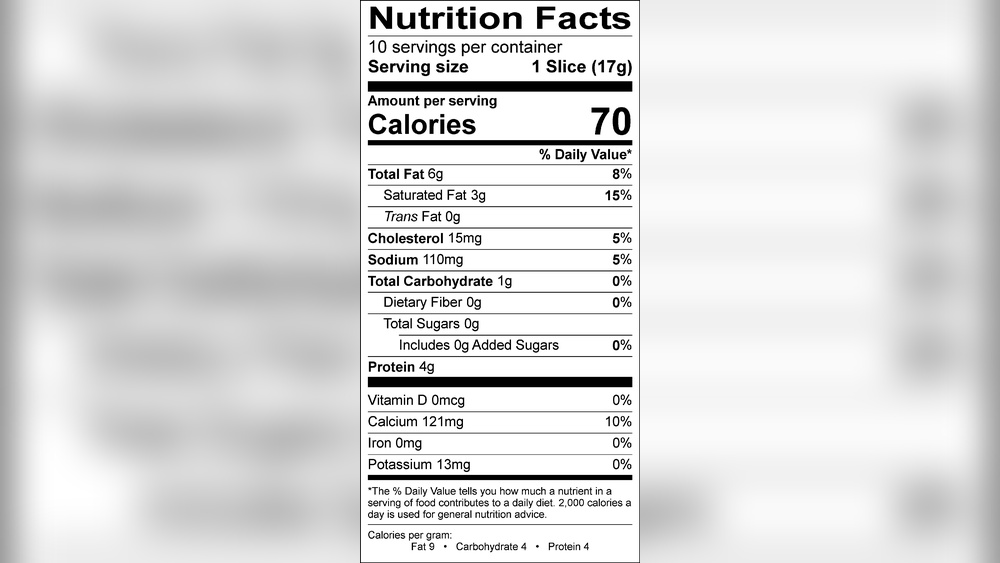Are you curious about what’s really inside those cheddar cheese slices you love? Whether you enjoy them in your sandwiches, melts, or snacks, understanding the nutrition facts can help you make smarter choices for your health.
From protein content to calcium levels and calories, cheddar cheese slices offer more than just great taste. You’ll discover the key nutritional details that matter to you, plus tips on choosing the healthiest options without sacrificing flavor. Keep reading to unlock the facts that can support your balanced diet and satisfy your cheese cravings!

Credit: www.sargento.com
Nutritional Breakdown
Understanding the nutritional breakdown of cheddar cheese slices helps in making better food choices. Each slice offers a mix of essential nutrients that support your daily health needs. This section explores the key nutrition facts of cheddar cheese slices, focusing on calories, protein, fats, carbohydrates, calcium, and vitamins.
Knowing these details helps balance your diet and enjoy cheese without worry. Let’s examine what one slice typically contains.
Calories And Energy
A typical cheddar cheese slice contains about 110 to 120 calories. These calories mainly come from fats and proteins. Cheese slices provide a compact energy source suitable for snacks or meals.
Protein Content
Each slice offers around 7 grams of protein. Protein supports muscle growth and repair. It also helps keep you full for longer periods.
Fat And Saturated Fat
Cheddar cheese slices have about 9 grams of total fat. Of this, nearly 6 grams are saturated fats. Saturated fats should be eaten in moderation to maintain heart health.
Carbohydrates And Sugars
Carbohydrates in cheddar cheese slices are very low, usually less than 1 gram. Sugars are minimal, often around 0.1 to 0.2 grams per slice. This makes cheddar cheese suitable for low-carb diets.
Calcium And Vitamins
A single slice provides about 200 milligrams of calcium. Calcium is vital for strong bones and teeth. Cheddar cheese also contains small amounts of vitamins A and B12, which support vision and energy metabolism.

Credit: www.sargento.com
Health Benefits
Cheddar cheese slices offer several health benefits beyond their rich taste. They provide essential nutrients that support different body functions. Including them in your diet can help meet daily nutritional needs.
These slices are a good source of calcium, protein, and other vital nutrients. They contribute to strong bones, muscle maintenance, and heart health. Let’s explore these benefits in detail.
Bone Health Support
Cheddar cheese slices are rich in calcium. Calcium is crucial for building and maintaining strong bones. It helps prevent bone loss and reduces the risk of fractures. Vitamin D in cheese aids calcium absorption. Eating cheddar supports overall bone health and strength.
Protein For Muscle Maintenance
Cheddar cheese slices contain high-quality protein. Protein is essential for muscle repair and growth. It also helps maintain muscle mass during aging. The amino acids in cheddar support muscle function. Regular intake can keep muscles healthy and strong.
Role In Heart Health
Cheddar cheese has nutrients that support heart health. It contains potassium, which helps control blood pressure. The protein in cheese can improve blood vessel function. Moderate consumption may promote better heart health over time.
Daily Consumption Considerations
Daily consumption of cheddar cheese slices requires thoughtful consideration. These cheese slices offer protein and calcium, but they also contain saturated fat and sodium. Eating them in moderation supports a balanced diet. Understanding how much to consume and potential effects helps maintain good health.
Recommended Serving Sizes
A typical serving size is one slice, around 20 grams. This portion provides about 110 calories and 7 grams of protein. Sticking to one or two slices daily fits most dietary needs. Avoid large portions to prevent excess calorie and fat intake.
Potential Dietary Concerns
Cheddar cheese contains saturated fat, which can affect heart health if eaten in excess. It also has sodium, which may raise blood pressure. People with lactose intolerance might experience discomfort. Keep servings small to reduce these risks.
Balancing With Other Foods
Pair cheddar slices with fruits, vegetables, or whole grains. This helps add fiber and vitamins missing in cheese. Combine with lean proteins and fresh produce for a well-rounded meal. Balance ensures you get nutrients without overdoing fat or salt.
Comparing Cheese Types
Cheese slices come in many types, each with unique nutrition facts. Comparing cheese types helps you choose the best option for your diet. Differences in protein, fat, sodium, and calcium levels affect health benefits. Understanding these can guide better food choices.
Cheddar Vs Mozzarella
Cheddar cheese slices have a strong flavor and more fat. They provide about 7 grams of protein per slice. Mozzarella slices are milder and lower in fat. Mozzarella often contains less sodium and calories. Both offer good calcium for bone health. Choose based on taste preference and fat content.
Processed Vs Natural Slices
Processed cheese slices contain added ingredients like emulsifiers and preservatives. Natural cheese slices have simple ingredients: milk, salt, and cultures. Processed slices often have more sodium and less protein. Natural slices provide better nutrition with fewer additives. For a cleaner diet, natural slices are a smarter choice.
Low Sodium Options
Sodium is a key factor in cheese nutrition. Some cheese slices have reduced sodium levels. Low sodium cheddar slices are available for heart health support. Mozzarella generally has less sodium than cheddar. Reading labels helps find lower sodium options. These slices support balanced blood pressure and overall health.
Choosing Healthy Cheese Slices
Choosing healthy cheese slices means paying attention to what is inside the package. Not all cheese slices offer the same nutrition or quality. Healthy choices support your body with good nutrients and avoid harmful substances. Understanding labels and ingredients helps make better decisions. Simple, natural cheese slices provide more benefits than highly processed ones.
Reading Ingredient Labels
Check the ingredient list carefully. The shorter the list, the better. Look for real cheese as the first ingredient. Avoid slices that list many chemicals or fillers. Ingredients like milk, salt, enzymes, and cultures show natural cheese. Watch out for terms like “cheese product” or “cheese food.” These often contain less cheese and more additives.
Avoiding Additives And Preservatives
Additives and preservatives can lower the quality of cheese slices. Ingredients such as artificial colors, flavors, and preservatives may affect health. These substances can cause allergies or digestive issues in some people. Choose cheese slices without artificial ingredients. Natural cheese has a better taste and is easier to digest.
Organic And Minimal Processing
Organic cheese slices come from animals raised without synthetic hormones or pesticides. This means fewer chemicals in the cheese. Minimal processing keeps cheese closer to its natural state. Avoid cheese slices that are highly processed or contain many additives. Organic and simple cheese slices offer richer flavors and better nutrition.
Cheese Slices In Different Diets
Cheddar cheese slices fit into many diets. Their taste and nutrition make them popular worldwide. Understanding how they work in different eating plans helps make better choices.
Low-calorie Diets
Cheddar cheese slices have moderate calories. One slice usually contains about 110 calories. This amount fits well in a low-calorie diet when eaten in moderation. Pairing slices with vegetables adds volume without many calories. Watch portion sizes to avoid extra calorie intake.
High-protein Diets
Cheddar cheese slices are a good protein source. Each slice offers around 7 grams of protein. This helps build and repair muscles. They work well as a protein snack or part of a meal. Combining cheese slices with other protein-rich foods supports a high-protein diet.
Low-sodium Diets
Cheddar cheese slices often contain moderate sodium. Some brands have less salt than others. People on low-sodium diets should check labels carefully. Choosing reduced-sodium cheese slices helps keep salt intake low. Balancing cheese with fresh, low-sodium foods improves heart health.
Lactose Intolerance Considerations
Cheddar cheese slices usually have low lactose. Aging reduces lactose content in cheddar. Many lactose-intolerant people can eat small amounts without issues. Trying a small portion first helps test tolerance. For severe intolerance, lactose-free cheese is a safer choice.

Credit: www.walmart.com
Frequently Asked Questions
What Is The Nutritional Value Of A Slice Of Cheddar Cheese?
A slice of cheddar cheese contains about 113 calories, 7 grams of protein, 0. 15 grams of sugar, zero fiber, and 202 mg of calcium. It supports bone health and provides essential nutrients for a balanced diet.
Are Cheddar Cheese Slices Healthy?
Cheddar cheese slices provide protein and calcium, supporting bone health. Choose unprocessed slices with simple ingredients for a healthier option. Limit intake due to saturated fat and sodium content.
Is 2 Slices Of Cheese A Day Ok?
Eating 2 slices of cheese daily is generally safe and provides protein and calcium. Choose low-sodium, unprocessed options for better health. Monitor portion sizes to avoid excess calories and saturated fat.
What’s The Healthiest Slice Of Cheese?
Mozzarella and cheddar are healthy for general nutrition due to high protein and calcium. Cottage cheese offers low calories and high protein. Swiss cheese contains less sodium. Choose unprocessed cheeses with simple ingredients for the healthiest slice.
Conclusion
Cheddar cheese slices offer a good source of protein and calcium. Each slice contains moderate calories and very little sugar. They support bone health and fit well in balanced diets. Choosing natural cheddar over processed options helps avoid extra additives.
Enjoy cheddar slices in sandwiches or snacks for simple nutrition. Remember to eat in moderation to maintain heart health. Overall, cheddar cheese slices provide tasty nutrition with essential nutrients.

